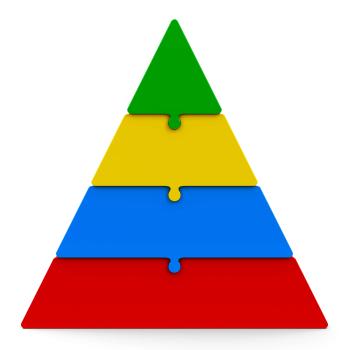Working in small groups, students read and discuss Elie Wiesel's memoir Night and then take turns assuming the "teacher" role, as the class works with four different comprehension strategies.

Using Student-Centered Comprehension Strategies with Elie Wiesel's Night

Grades
|
Investigating Names to Explore Personal History and Cultural Traditions
6 - 8
Lesson Plan
| Standard Lesson
Students investigate the meanings and origins of their names in order to establish their own personal histories and to explore the cultural significance of naming traditions.

Grades
|
Literature Circle Roles Reframed: Reading as a Film Crew
6 - 8
Lesson Plan
| Standard Lesson
Capture students' enthusiasm for film and transfer it to reading and literature by substituting film production roles for the traditional literature circle roles.

Grades
|
So What Do You Think? Writing a Review
9 - 12
Lesson Plan
| Standard Lesson
Writing a review of an author's work challenges students to develop their critical thinking skills. It provides an opportunity for students to speak their mindsand to enjoy being heard.

Grades
|
Dear Librarian: Writing a Persuasive Letter
3 - 5
Lesson Plan
| Standard Lesson
Students write persuasive letters to their librarian requesting that specific texts be added to the school library. As they work, students plan their arguments and outline their reasons and examples.

Grades
|
Audio Listening Practices: Exploring Personal Experiences with Audio Texts
9 - 12
Lesson Plan
| Standard Lesson
Students keep a daily diary that records how and when they listen to audio texts, then analyze the details and compare their results to published reports on American radio listeners.

Grades
|
Creating Family Timelines: Graphing Family Memories and Significant Events
3 - 5
Lesson Plan
| Standard Lesson
Students interview family members, and then create graphic family timelines based on important and memorable family events.

Grades
|
Graphing Plot and Character in a Novel
3 - 5
Lesson Plan
| Standard Lesson
In this graphical mapping project, students assign a value to the events, characters, and themes in a novel and think about how the elements of the story are all interconnected.

Grades
|
Characters in Because of Winn-Dixie: Making Lists of Ten
3 - 5
Lesson Plan
| Standard Lesson
The list of ten things about Opal's absent mother that her father shares in Because of Winn-Dixie serves as inspiration for students to create their own lists describing literary characters.

Grades
|
Our Classroom: Writing an Owner's Manual
3 - 5
Lesson Plan
| Standard Lesson
Students write an owner's manual that helps them get to know their classroom, provides them with a sense of ownership, and lets others know about their classroom.

Grades
|
On a Musical Note: Exploring Reading Strategies by Creating a Soundtrack
6 - 8
Lesson Plan
| Standard Lesson
Students create a soundtrack for a novel that they have read, as they engage in such traditional reading strategies as predicting, visualizing, and questioning.

Grades
|
Star-Crossed Lovers Online: Romeo and Juliet for a Digital Age
9 - 12
Lesson Plan
| Standard Lesson
Explore the modern significance of an older text, such as Shakespeare's Romeo and Juliet, by asking students to create their own modern interpretation of specific events from the drama.

Grades
|
Copyright Infringement or Not? The Debate over Downloading Music
9 - 12
Lesson Plan
| Unit
This lesson takes advantage of students' interest in music and audio sharing. Students investigate multiple perspectives in the music downloading debate and develop a persuasive argument for a classroom debate.

Grades
|
You Know the Movie is Coming—Now What?
6 - 8
Lesson Plan
| Standard Lesson
In this lesson, students read a literary text with the eye of a director, selecting scenes from the text and putting a cinematic spin on them.

Grades
|
Once Upon a Time Rethought: Writing Fractured Fairy Tales
3 - 5
Lesson Plan
| Standard Lesson
Students read and analyze fairy tales, identifying their common elements. They then write their own "fractured" fairy tales by changing one of the literary elements found in the original.

Grades
|
Opening the Door for Reading: Sharing Favorite Texts to Build Community
3 - 6
Lesson Plan
| Standard Lesson
In this lesson, students build classroom community by exploring environmental print and a teacher-created display that focuses on a favorite book. They then create and share their own presentations.

Grades
|
How Does My Garden Grow? Writing in Science Field Journals
K - 2
Lesson Plan
| Standard Lesson
Students plant a garden and study its growth using the inquiry process of questioning and exploring. As they research and study, students record their observations in a field journal.

Grades
|
Literature as a Jumping Off Point for Nonfiction Inquiry
3 - 5
Lesson Plan
| Unit
Students use text sets to research a topic inspired by a fiction book they have read. A text set is a collection of multiple text genres with a single focus.

Grades
|
Our Community: Creating ABC Books as Assessment
K - 2
Lesson Plan
| Standard Lesson
Students create alphabet books, which are used as an integrated assessment with science, health, social studies, and any other content area. This lesson plans looks at the theme of community.

Grades
|
Naming in a Digital World: Creating a Safe Persona on the Internet
9 - 12
Lesson Plan
| Standard Lesson
Students explore naming conventions in digital and non-digital settings then choose and explain specific names and profiles to represent themselves online.